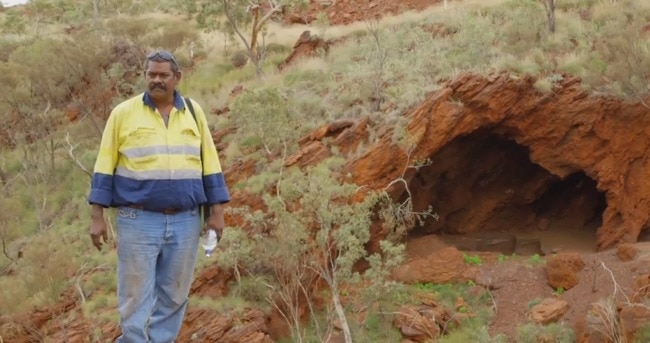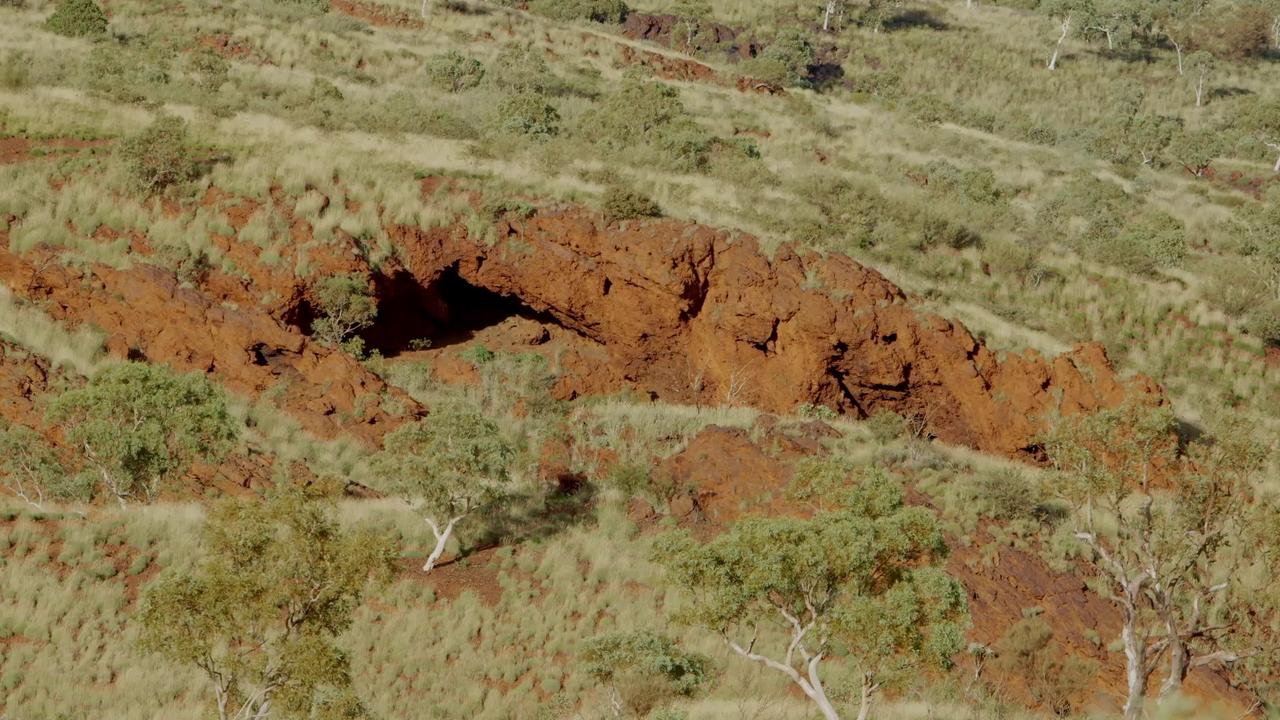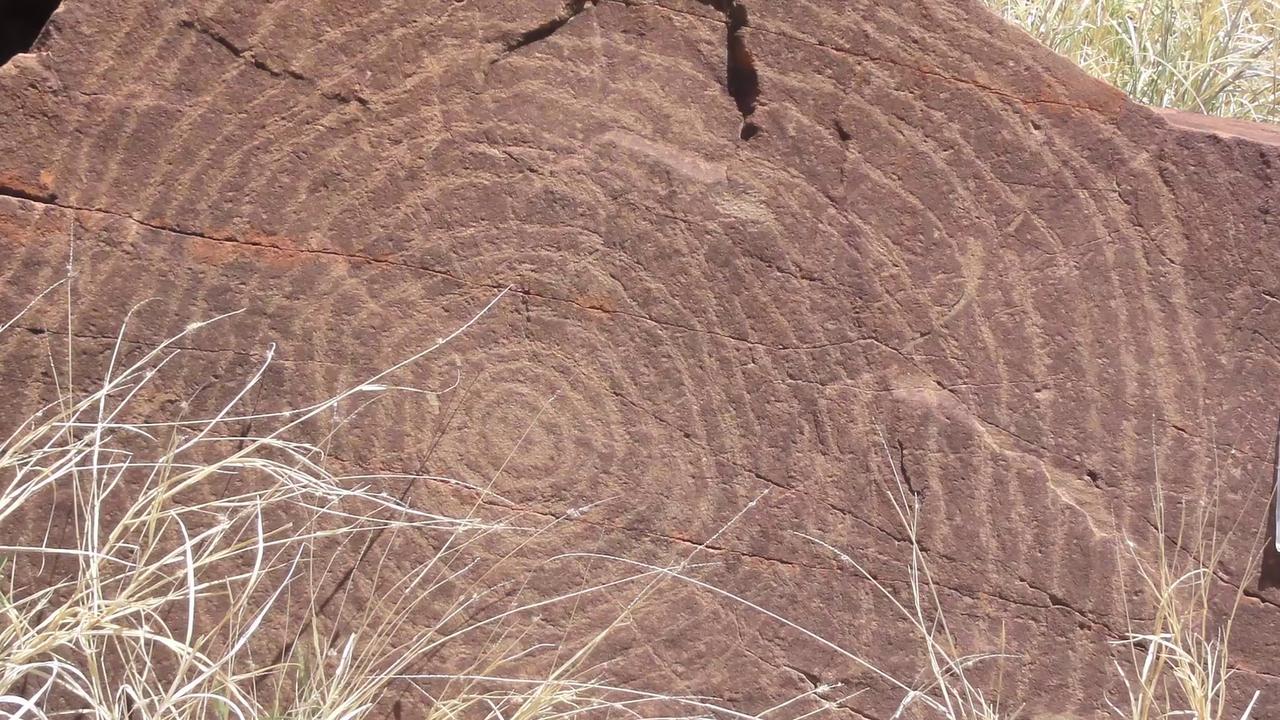Inquiry into the destruction of 46,000 year-old caves at Juukan Gorge comes with a warning
A final report has been issued with a dire warning from experts after the destruction of ancient Australian sites dating back 46,000 years.

A final report has been issued with a dire warning from experts after the destruction of ancient Australian sites dating back 46,000 years.
A federal parliamentary committee on Monday recommended a number of key changes to protect sacred sites across the country after mining giant Rio Tinto destroyed two ancient Australian caves in a giant detonation in May last year – despite urgent appeals warning the company of its cultural significance.
The caves in the Juukan Gorge, in the Pilbara region of Western Australia, were destroyed in the blast in order to expand the mining company’s Brockman 4 iron ore mine.
The rock shelters were damaged on May 23 despite archaeological excavations in 2014 that revealed “new information” surrounding the site.
The site is significant because it reveals human habitation dating back to the last ice age when most of the land around the area was deserted by people who preferred to base themselves on the coast.
Numerous archaeologists have noted the site’s historical significance. Subsequent archaeological excavation revealed ancient artefacts including grinding stones, a bone sharpened into a tool and 4000-year-old braided hair.


Despite receiving urgent appeals against the planned destruction of the caves from traditional owners, then-Rio Tinto boss Jean-Sebastien Jacques said the site was already strapped with explosives and it was too unsafe to stop the blast.
The decision caused international outrage and outraged traditional owners and Australians across the country.
Rio Tinto “unreservedly apologised” but it was too late, with three senior executives exiting the mining giant since, conceding it is “ultimately accountable for the failings”.
In it’s final report, titled A Way Forward, the Joint Standing Committee on Northern Australia warned the destruction of Juukan Gorge is “not unique” and could happen again, in “an extreme example of the destruction of Aboriginal and Torres Strait Islander cultural heritage which continues to happen in this country”.
Hon Warren Entsch MP, Chair, said the disaster caused “caused immeasurable cultural and spiritual loss, as well as profound grief for the Puutu Kunti Kurrama and Pinikura peoples.
“Rio Tinto’s actions were inexcusable and an afront, not only to the PKKP but to all Australians,” he said.
“Across the Australian landscape are thousands of sites of cultural important to Aboriginal and Torres Strait Islander peoples.
“Just as other nations protect cultural sites of significance—the Colosseum, the Parthenon, the Great Pyramid of Giza—Australia must also protect its sites. “These international sites date back thousands of years, but many Aboriginal and Torres Strait Islander heritage sites are tens of thousands of years old.
“It is inconceivable that Australia has not developed proper protections for such sites, andaction must be a matter of national priority.”
The Joint Committee on Northern Australia has presented its report into the destruction of caves at the Juukan Gorge https://t.co/QdiqUef4Sx
— Australian Senate (@AuSenate) October 18, 2021
Today’s Juukan Gorge decision proves our current laws fail to protect sacred sites & actually encourage big mining corporations to blow them up.
— Adam Bandt (@AdamBandt) October 18, 2021
Colonial violence continues to wreck the climate and run roughshod over First Nations sovereignty.
Upon tabling the final report, Mr Entsch said it was clear that extensive changes were required to ensure the protection of Aboriginal and Torres Strait Islander peoples cultural heritage.
The report makes eight recommendations focusing on urgent changes to federal law that will enhance Aboriginal and Torres Strait Islander people’s cultural heritage protections.
Rio Tinto Chief Executive Jakob Stausholm said: “We have been working hard to rebuild trust and meaningful relationships with the PKKP people and other Traditional Owners. Rio Tinto is absolutely committed to listening, learning and showing greater care, and this remains a top priority.
“We know this will take time and there will be challenges ahead, but we are focused on improving our engagement with Indigenous Peoples and our host communities to better understand their priorities and concerns, minimise our impacts, and responsibly manage Indigenous cultural heritage in and around our operations.”
We welcome the final report of the Joint Standing Committee on Northern Australia following its inquiry into the destruction of rock shelters at Juukan Gorge on the land of the Puutu Kunti Kurrama and Pinikura people (PKKP) in the Pilbara region of Western Australia.
— Rio Tinto (@RioTinto) October 18, 2021
Among the recommendations:
• A need for an overarching Commonwealth legislative framework which should be developed through a process of co-design with Aboriginal and Torres Strait Islander peoples.
• Administration responsibility of the Aboriginal and Torres Strait Islander Heritage Protection Act 1984 and the Environmental Protection and Biodiversity Conservation Act 1999 should be transferred to the Minister for Indigenous Australians (currently the Envirnment Minister is responsible).
• There should be an Australian Government review of the Native Title Act 1993.
• The Australian Government should endorse and commit to implementing Dhawura Ngilan: A Vision for Aboriginal and Torres Strait Islander Heritage in Australia.
• There is a need for the development of a model for cultural heritage truth telling.
• There is a need to establish an independent fund to administer funding of prescribed body corporates under the Native Title Act 1993.
Aboriginal Affairs Minister Stephen Dawson welcomed the Senate Inquiry Joint Standing Committee and said an Aboriginal Cultural Heritage Bill is hoped to replace outdated legislation and includes a series of measures designed to prevent another Juukan Gorge tragedy. It is currently being finalised before being introduced to State Parliament.
The Bill removes the controversial Section 18 approvals process under the Aboriginal Heritage Act 1972 (the 1972 Act) and, in line with Native Title laws, focuses on agreement making with traditional owners to ensure Aboriginal people can negotiate outcomes for projects and opportunities on their lands.

According to a statement from the McGowan government, the new Bill “establishes world-class protections for the management of Aboriginal Cultural Heritage and was designed on the principles of the Burra Charter.
“Under the Burra Charter, the protection and conservation of heritage should demonstrate an understanding of the place and its cultural significance, including its meaning to people, before making decisions about its future, and involves the relevant communities associated with the heritage. The new Bill explicitly provides for this.
“Traditional owners can apply to have a really important area made a Protected Area and no one can apply to damage Aboriginal cultural heritage in the area.”
They promise local Aboriginal groups “will be the primary decision makers and will have significant influence in the management of cultural heritage within their appointed area”, another recommendation of the final report.
“Destruction of the 46,000-year-old caves at Juukan Gorge was a tragedy and the WA Government is working hard to ensure better legislative protections are afforded to our sacred cultural heritage sites,” Mr Dawson said.
“Better protection for Aboriginal cultural heritage will absolutely be achieved once the new Aboriginal Cultural Heritage Bill becomes law - and the McGowan Government is committed to this reform.
“The central foundation of the Bill is consultation, negotiation and agreement making between Aboriginal parties and proponents - the very foundation of the United Nations Declaration on the Rights of Indigenous Peoples.
“It also legally protects Aboriginal people from being silenced, requires proponents to provide full disclosure of all possible options for their operation and mandates voluntary consent of the traditional owners.”






